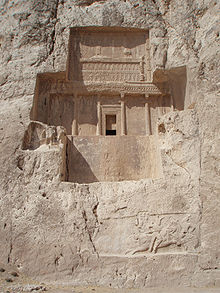Darius II
Dareios II. Ochos , also Darius II., ( Persian داریوش Dāriyūsch [ dɔːriˈuːʃ ]; Old Persian: Dārayavahusch , Dārayavausch ) was from 423 to 404 BC. Chr. Persian Great King .
Life
Dareios II was occasionally (but only in later Greek sources) called Nothos , which means something like illegitimate child . His mother came from Babylonia and was a concubine of I. Artaxerxes been.
Darius initially acted as the satrap of Hyrcania . After the death of his father Artaxerxes, his half-brothers Xerxes II and Sogdianos first came to power. Xerxes was murdered after a short time by Sogdianos, who in turn could only hold on to power for about six months before he was overthrown by Darius.
During the reign of Darius, the last phase of the Peloponnesian War between Athens and Sparta fell and with it the Persian influence on Greek politics, especially through financial support ( Thucydides , The Peloponnesian War 8, 5; 8, 37; 8, 58). With the help of the Persians, Sparta, whose general Lysander was able to come to an understanding with the Persian prince Cyrus , finally won the war. In general, the Persian Empire fueled and supported the wars between the Greek city-states in the centuries that followed.
Dareios had to fight riots repeatedly. In Egypt , which dates from 525 BC. BC to 404 BC Was Persian satrapy, there were uprisings shortly after his accession to the throne, which had their focus in the city of Sais . Towards the end of his reign, Egypt finally achieved partial autonomy from the empire. Unrest also erupted in Asia Minor , with the Sardis rebellion being put down by Tissaphernes at the beginning of Darius's reign . An uprising in the media was also suppressed.

Darius died in Babylon . His son Cyrus gained fame through his attempted coup and the train of ten thousand Greek mercenaries described in the Anabasis Xenophons .
swell
Darius II is mentioned by several ancient Greek historians, such as Ktesias of Knidos in his Persica and by Xenophon in his Hellenica and his Anabasis . Dareios is also attested in Aramaic Elephantine papyri . These report, among other things, riots and a looting of the YHWH temple in Elephantine in 410 BC. Another papyrus, dated to the fifth year of his reign, contains an instruction sent to Arsames , the satrap of the province of Egypt. In the so-called " Easter Letter of Dareios ", the Passover festival is set for the twilight of the 14th day in Nisan . The festival of unleavened bread , the rites of which are also explained, should be celebrated from the 15th day until sunset on the 21st day of the month of Nisan. Furthermore, Darius II is mentioned in the Old Testament in the book of Nehemiah (Neh 12, 22) in connection with a record of the heads of the Levite clans and the priests that lasted up to his reign. Persian inscriptions name his building activity.
family
Darius II and Parysatis had thirteen children, but only four of them had reached adulthood. The known children were:
- Arsakes, later Artaxerxes II. († 359/358 BC).
- Cyrus the Younger († 401 BC).
- Ostanes († probably 358 BC), grandfather of Dareios III.
- Oxathres
- Amestris, married to the satrap Terituchmes († 409/408 BC).
literature
- Pierre Briant : From Cyrus to Alexander: A History of the Persian Empire. Eisenbrauns, Winona Lake IN 2002, ISBN 978-1-57506-574-8 .
- Matt Waters: Ancient Persia. A Concise History of the Achaemenid Empire, 550-330 BCE. Cambridge University Press, Cambridge 2014, ISBN 978-0-521-25369-7 .
Web links
- Darius II . In: Ehsan Yarshater (Ed.): Encyclopædia Iranica (English, including references)
Remarks
- ↑ Pierre Briant: From Cyrus to Alexander: A History of the Persian Empire. Winona Lake 2002, p. 725.
- ^ Hermann A. Schlögl: The ancient Egypt. Munich 2006, p. 350.
- ↑ Comprehensive evaluation in Pierre Briant: From Cyrus to Alexander: A History of the Persian Empire. Winona Lake 2002, p. 1153 (index, see Darius II there ).
- ^ Thomas Schneider: Lexicon of the Pharaohs . edited and updated edition. Deutscher Taschenbuchverlag, Munich 1996, p. 108.
- ^ Translation reprinted in Texts from the Environment of the Old Testament Volume 1, Old Series, p. 253.
- ↑ Ktesias von Knidos , Persika , fragment 15, § 51.
| predecessor | Office | successor |
|---|---|---|
| Sogdianos |
Persian king 423–404 BC Chr. |
Artaxerxes II. |
| Sogdianos |
Pharaoh of Egypt 27th Dynasty |
Artaxerxes II. |
| personal data | |
|---|---|
| SURNAME | Darius II |
| ALTERNATIVE NAMES | Dareios II. Ochos (full name); Dariyush; Dārayavahush; Dārayavausch; داریوش (Persian) |
| BRIEF DESCRIPTION | Persian king (423 BC-404 BC) |
| DATE OF BIRTH | before 423 BC Chr. |
| DATE OF DEATH | after 405 BC Chr. |
| Place of death | Babylon |